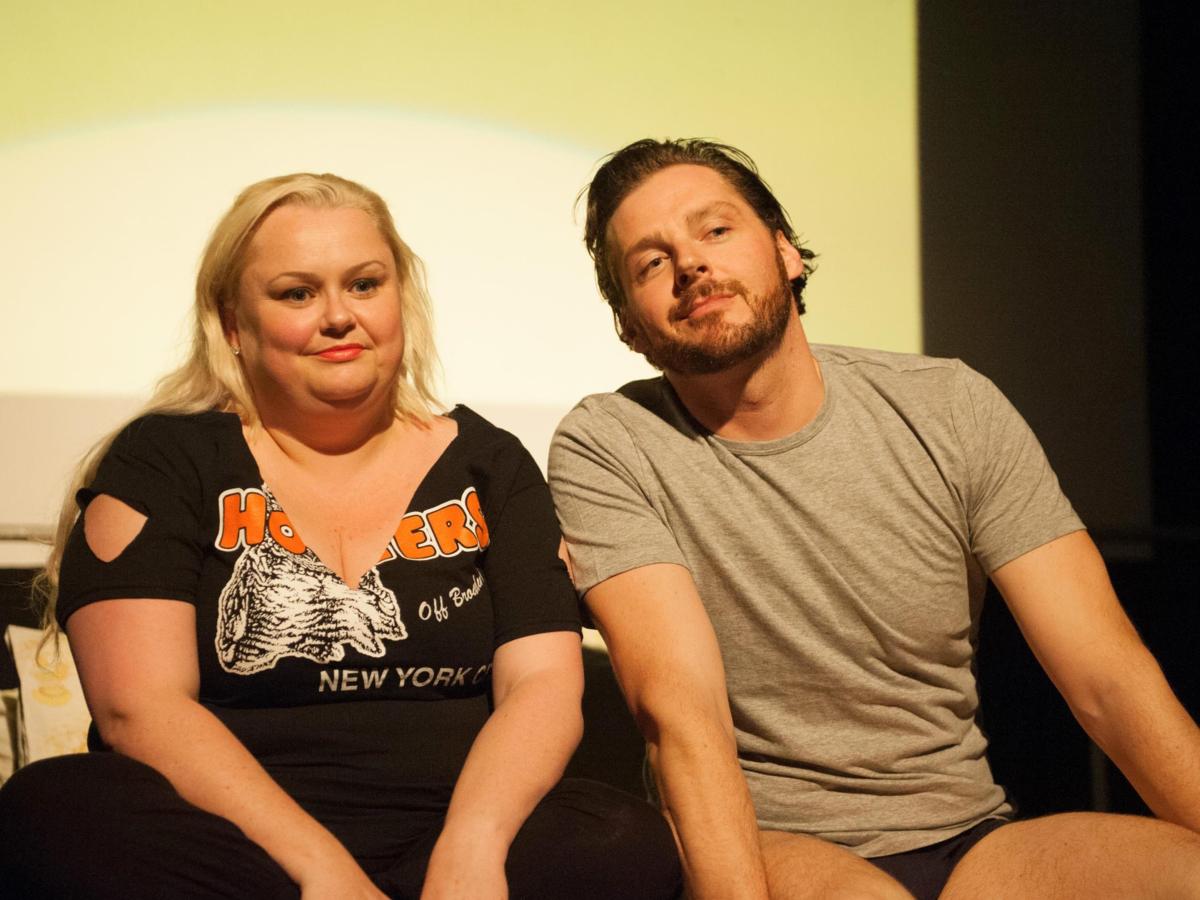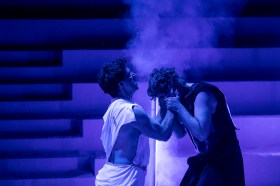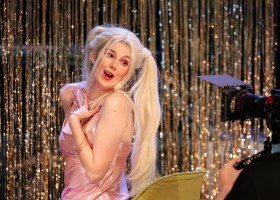Neil Labute is an acquired taste. Revered by many for his astute – and often bleak – studies of the human condition and reviled by others for his misogynistic tendencies, Labute’s Fat Pig could easily delight and deter both camps. It looks at our basic need to be good, to look past what society rejects in others. It highlights our weaknesses that often tend to prevent us from embracing what lies beyond the surface. Labute bravely says that he sees a lot of himself in this play (as I’m sure he does with most of his others) and for that honesty, the play is to be admired. Don’t expect a story wrapped up tidily with bows. Labute isn’t about that. The play’s ending packs a wallop and will make you look at your own foibles with blinding clarity.
Tom (Lyall Brooks) meets Helen (Lulu McClutchy) in a crowded food court and they strike up an awkwardly delightful rapport that has Tom surprising himself when he asks for Helen’s number. She gives it to him, skeptical that she will ever hear from him again. The issue is that Helen is a particularly large woman, unlucky in love and resolute to a world of staying at home, watching DVDs and leading a sexless existence. But for all that, her charm and wit, not to mention her obvious sex appeal, piques Tom’s perception of women that throws him for a loop.
This is Tom’s story and his battle to wrestle with the fact he falls for a large woman, despite the shock and protestations from his annoyingly shallow co-worker Carter (Patrick Harvey), his stunning ex-girlfriend Jeannie (Cassandra McGrath) and society as a whole. The play allows us to hear all sides of the argument for why or why not these two should be together. Tom likes Helen’s body but he knows the world does not.
Fat Pig is Lab Kelpie’s inaugural production and they have made a fair fist of a difficult play. Ultimately though, one has to wonder why it doesn’t work despite the sum of its parts. Brooks is a stunning actor, with the looks and charisma of a young Anthony Newley. He knows how to play comedy, with impeccable timing and pace. His energy, for the most part, was on the money and he was the only actor that you could hear every word from. In the first scene with McClutchy he made us love him, playing adorable to the hilt, and established our desire for this relationship to succeed. But for all that, it was difficult to fully believe his character. Moments of intimacy with Lulu didn’t ring true and the emotion at the end hit a false note meaning that, instead of understanding his plight, he came off as unlikable. There needed to be more moments grounded in a reality for us to really care.
This was also true of the very talented Mr Harvey. Quite possibly a comic genius, the actor knows how to find hilarious moments in the smallest gesture or the most hideous of phrases. The audience found themselves grimacing at some of the vile things coming out of his mouth while at the same time hopelessly laughing in spite of themselves. We aren’t meant to like this man, representing all the callous things wrong with our society. But at the same time, it was hard to find the reality in the character and Harvey’s interpretation did not help, never quite being able to find a depth underneath the prejudice and smart quips. Magrath’s Cassie had the biggest problem with this, the portrayal feeling very shrill and one note. Angry doesn’t always mean yelling and it would have been great for the director and actor to have found other ways of relaying this woman’s venom.
Sadly, for this reviewer at least, the major issue came down to the title role. Whilst McClutchy was actually the most believable of the cast, the problem lay with the interpretation. The actress lacked enough vivaciousness and confidence in who the character is for us to believe that Tom would instantly see past her appearance. It also meant that the defensive walls that Helen had built were not big enough, her self-deprecation too slight as a result. McClutchy played her as a victim and this caused major problems for the end of the play. It came across as too pitiful and unsatisfactory. McClutchy’s Helen was fighting for love not her self-worth. Part of Helen’s charm is that she does know who she is and makes no apologies for that. But this production whittles her to a feeble mess and it jarred.
Labute writes dialogue in a very particular way with much cutting off of sentences by other characters and changes of thought mid-speech. This style is difficult to accomplish well. There were many moments where one character would stop mid-sentence, expecting to be cut off and wouldn’t be until a beat or two later. What was the rest of the sentence? Or a character would change thought mid-sentence but the audience could not see or feel that change from the actor. It’s a delicate balance and one that could have been refined to help with the truth of the piece as it leaves certain moments feeling stagey and “acted”.
Peter Mumford’s set was serviceable but the decision to place the barriers around the set seemed an odd choice, rendering the look bland and unappealing despite the swanky furniture. The slides between the scenes were confusing and strange. Audience members could be heard wondering what the relevance was. The lounge music was appropriate in a surreal way but worked against the tone of the play and Tanje Ruddick’s lighting was atmospheric and well suited for the limited scenes.
Frederiksen is to be applauded for the pacing and energy he has brought to the piece. I wonder though if he thought hard about the style he wanted. There were a few moments of high farce and others of forced pathos. The opening scene was an absolute treat but sadly nothing matched that essence for the rest of the evening.
Rating: 2 1/2 stars
Fat Pig
By Neil Neil Labute
Chapel off Chapel, Prahran
9 – 20 October
Image: Lulu McClatchy & Lyall Brooks – photo credit Sarah Walker






